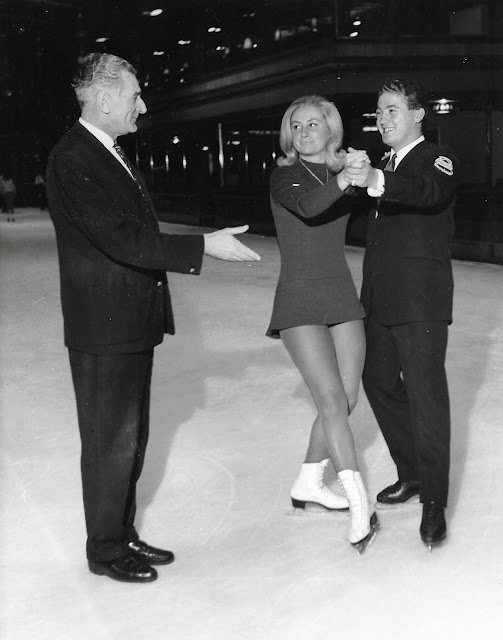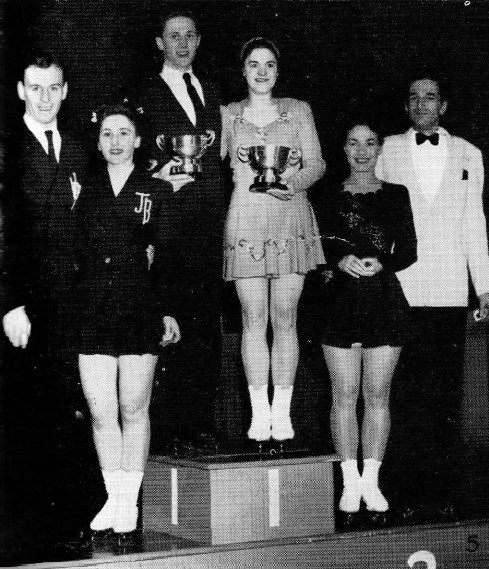Alex D.C. Gordon, Lesley Norfolk and John Pearce. Photo courtesy "Ice & Roller Skate" magazine.
"It is obvious that the elements of figures are not only a benefit, but are absolutely essential in the mastery of good ice dancing." - Alex D.C. Gordon, "Winter Sports" magazine, November 1964
The son of Margaret Cecelia (Crawford) and Alexander Theodore Gordon, Alexander 'Alex' David Crawford Gordon was born on February 3, 1913 at Freefield House in Rayne, Aberdeenshire, Scotland.
When he was two years old, his father (who served as Lieutenant-Colonel during The Boer War) abandoned his mother, moved to Stirlingshire and shacked up with another woman. Alex and his mother received no support from his father during The Great War. When the War ended, their divorce was finalized and his father was elected as the Member of Parliament for Aberdeen and Kincardine Central. His father passed away in March of 1919 at the age of thirty-seven, a victim of the Spanish flu pandemic. By the thirties, Alex was living in Putney Hill, London with his mother and her third husband. In 1937, he married Elspeth Keech in Edinburgh. She was seventeen; he twenty-four. They divorced in 1941, the same year his mother passed away.
During the years leading up to World War II, Alex developed a passion for figure skating. He passed the National Skating Club's Gold Dance, Silver Figure and Pair (International) tests and Bronze English Style Figure tests. After the War, he resumed skating and as a representative of Queen's Ice Dance Club. He won the Club's drawn partners contest in 1946 with Marjorie Widdowson and three consecutive bronze medals in the British Ice Dance Championships with Barbara 'Bunty' Radford, narrowly missing out on a fourth in 1950. His passion for the sport even led him to spend some time in Johannesburg, South Africa where Arthur Apfel, the 1947 World Bronze Medallist was teaching.
Bunty Radford and Alex D.C. Gordon (left), Sybil Cooke and Bob S. Hudson (center) and Julie and Bill Barrett (right). Photo courtesy "Skating World" magazine.
Though a talented skater, Alex's most important contributions to figure skating and ice dancing were on the other side of the boards. He served on the National Skating Association's Council and Ice Figure Committees for over twenty-five years and acted as chair of the Ice Dance Committee for several years. He was a first-class judge in singles, pairs and ice dance, as well as an ISU judge and referee for both figures and dance. He judged and refereed at countless British, European and World Championships and served as an assistant referee at both the 1960 and 1964 Winter Olympic Games. He also served as a Substitute Member and Member of the ISU's Ice Dance Committee for a decade and was a very important figure in the development of the discipline during the fifties and sixties - a golden era when British ice dancers dominated the sport.
 |
| Photo courtesy "Skating World" magazine |
As an official, Alex more than once found himself at the center of controversy. In 1948, while serving on the National Skating Association's Council, he published a highly critical letter which caused much bad blood. He complained the Council was slated in favour of roller skaters and that there were too many judges who didn't skate (anymore) themselves or attend rinks when they weren't judging. He claimed these judges were "completely out of touch" with the sport's progress as a result. In 1951, he gave one skater scandalously low mark of 2.8, which resulted in a barrage of complaints and in 1965, he found himself in the center of a scandal when a petition circulated asking the National Skating Association to ban him from judging at the British Championships. In her book "Figure Skating History: The Evolution Of The Dance", Lynn Copley-Graves summarized, "An ISU Special Committee appointed at Alex Gordon's request investigated allegations that he had coached and judged his own pupils. In the hearings, Alex was found to have freely given advice to pupils of one or two professionals and to have inadvertently aroused adverse comment among other skaters and pros. The Special Committee found no evidence of bias in his judging cards, stressed the need for utmost discretion by all judges in their interactions with competitors and their pros, and closed the matter. This meeting, held in strictest confidence, was breached by one person who spoke publicly about it."
Despite these complaints, Alex served as a mentor to many Scottish skaters and was very well-liked by his judging peers. When he wasn't at a rink or in a meeting, he was busy running The Devil's Punchbowl Hotel in Hindhead (which is still in operation today) with his business partner, World and British Professional Champion John Pearce.
Alex passed away on January 14, 1973 in Surrey at the age of fifty-nine. For his services to British skating, he was posthumously awarded an Honorary Membership to the National Skating Association.
Skate Guard is a blog dedicated to preserving the rich, colourful and fascinating history of figure skating. Over ten years, the blog has featured over a thousand free articles covering all aspects of the sport's history, as well as four compelling in-depth features. To read the latest articles, follow the blog on Facebook, Twitter, Pinterest and YouTube. If you enjoy Skate Guard, please show your support for this archive by ordering a copy of figure skating reference books "The Almanac of Canadian Figure Skating", "Technical Merit: A History of Figure Skating Jumps" and "A Bibliography of Figure Skating": https://skateguard1.blogspot.com/p/buy-book.html.


